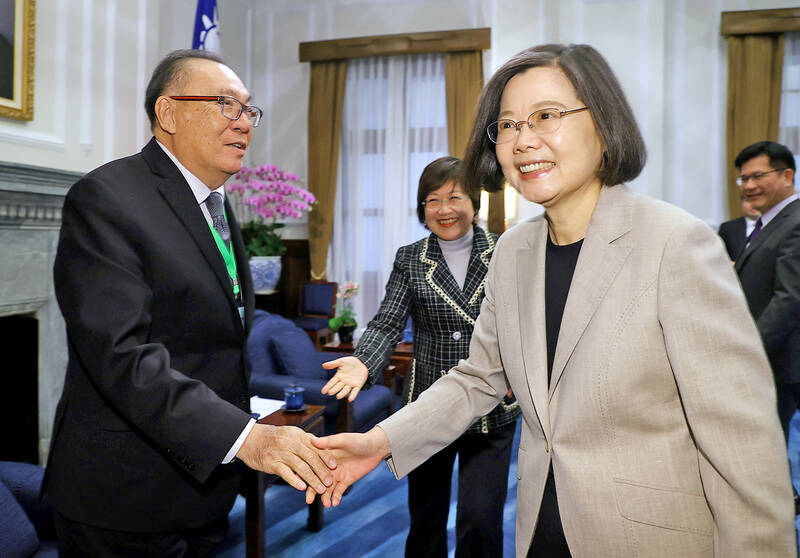President Tsai Ing-wen (蔡英文) yesterday encouraged overseas Taiwanese businesses to return home and invest locally.
She made the remarks during a meeting with a Taiwanese Chambers of Commerce of North America (TCCNA) delegation.
Tsai thanked the organization for voicing support for Taiwan at international events and expanding the nation’s influence, citing as an example the timely donation it made to Turkey after a magnitude 7.8 earthquake struck in February.

Photo: CNA
The TCCNA also strives to deepen Taiwan’s ties with the US and seeks economic and trade opportunities, such as when it met with US Secretary of Commerce Gina Raimondo and US lawmakers in March, she said.
The US-Taiwan Initiative on 21st-Century Trade has made significant progress during two rounds of negotiations, Tsai said, adding that both sides have agreed to continue discussions.
After finalizing the initiative, hopefully this year, Taiwan hopes to explore the possibility of signing a free-trade agreement with the US, she said.
As Taiwan is the US’ eighth-largest trade partner and the two sides have complementary industrial structures, deepening Taiwan-US relations would certainly benefit people in both countries, she said.
The government’s Invest in Taiwan programs, which run until next year, aim to encourage overseas Taiwanese businesses to return and invest locally, Tsai said.
The programs have stimulated investment of more than NT$2 trillion (US65.2 billion), while multinational corporations such as ASML and Merck have made huge investments in Taiwan in the past few years as they are positive about Taiwan’s development prospects, she said.
Tsai asked the TCCNA to help Taiwan further raise its international visibility and connect with the world.
The delegation later met with Premier Chen Chien-jen (陳建仁), who echoed Tsai’s call and encouraged investment from overseas Taiwanese businesses.
Chen acknowledged the organization’s effort to unite overseas Taiwanese businesses and build a solid foundation for non-governmental exchanges between Taiwan and North America.
Despite a difficult international situation involving authoritarian expansion, climate change, disinformation and cybersecurity threats, Taiwan can turn risks into opportunities just as it overcame the COVID-19 pandemic, he said.
The focus of the TCCNA this year is to improve economic and trade relations between Taiwan and the US, TCCNA president Tom Wu (吳東昇) said.
The organization is promoting the signing of a Taiwan-US bilateral trade agreement, supporting Taiwan’s participation in the Indo-Pacific Economic Framework for Prosperity and calling on the US to eliminate double taxation between the countries, he said.
Taiwanese businesses overseas are an important force in promoting citizen diplomacy through soft power, Wu said.
Young talent in the 35 local chambers across North America are using their advantage in language to integrate the TCCNA’s activities into mainstream society, he added.

The Coast Guard Administration (CGA) yesterday said it had deployed patrol vessels to expel a China Coast Guard ship and a Chinese fishing boat near Pratas Island (Dongsha Island, 東沙群島) in the South China Sea. The China Coast Guard vessel was 28 nautical miles (52km) northeast of Pratas at 6:15am on Thursday, approaching the island’s restricted waters, which extend 24 nautical miles from its shoreline, the CGA’s Dongsha-Nansha Branch said in a statement. The Tainan, a 2,000-tonne cutter, was deployed by the CGA to shadow the Chinese ship, which left the area at 2:39pm on Friday, the statement said. At 6:31pm on Friday,

The Chinese People’s Liberation Army Navy’s (PLAN) third aircraft carrier, the Fujian, would pose a steep challenge to Taiwan’s ability to defend itself against a full-scale invasion, a defense expert said yesterday. Institute of National Defense and Security Research analyst Chieh Chung (揭仲) made the comment hours after the PLAN confirmed the carrier recently passed through the Taiwan Strait to conduct “scientific research tests and training missions” in the South China Sea. China has two carriers in operation — the Liaoning and the Shandong — with the Fujian undergoing sea trials. Although the PLAN needs time to train the Fujian’s air wing and

STRIKE: Some travel agencies in Taiwan said that they were aware of the situation in South Korea, and that group tours to the country were proceeding as planned A planned strike by airport personnel in South Korea has not affected group tours to the country from Taiwan, travel agencies said yesterday. They added that they were closely monitoring the situation. Personnel at 15 airports, including Seoul’s Incheon and Gimpo airports, are to go on strike. They announced at a news conference on Tuesday that the strike would begin on Friday next week and continue until the Mid-Autumn Festival next month. Some travel agencies in Taiwan, including Cola Tour, Lion Travel, SET Tour and ezTravel, said that they were aware of the situation in South Korea, and that group

Taiwanese celebrities Hank Chen (陳漢典) and Lulu Huang (黃路梓茵) announced yesterday that they are planning to marry. Huang announced and posted photos of their engagement to her social media pages yesterday morning, joking that the pair were not just doing marketing for a new show, but “really getting married.” “We’ve decided to spend all of our future happy and hilarious moments together,” she wrote. The announcement, which was later confirmed by the talent agency they share, appeared to come as a surprise even to those around them, with veteran TV host Jacky Wu (吳宗憲) saying he was “totally taken aback” by the news. Huang,